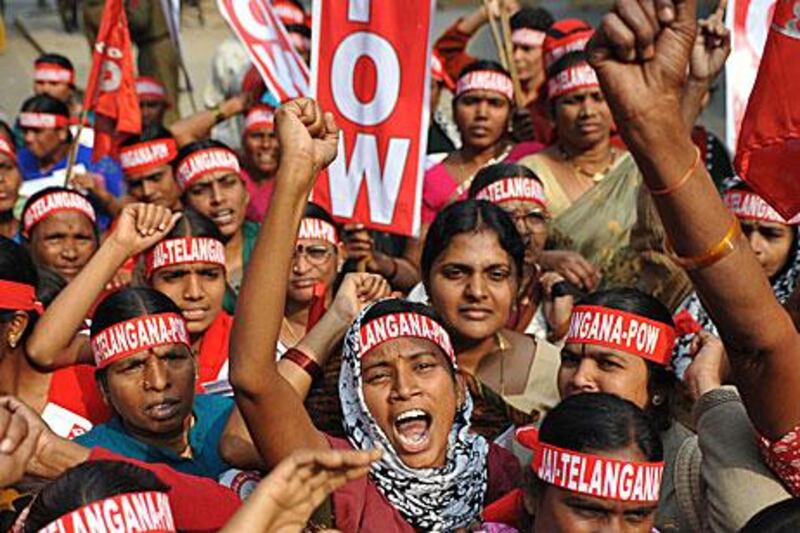NEW DELHI // Beset on all sides by protests over corruption, the formation of new states and plans to allow foreign investment in retail, the Indian government is lurching from one crisis to another when it desperately needs to prove it can address growing economic concerns.
The scenes have become familiar - parliament opens and is engulfed in raucous cacophony as members storm the well, shouting their discontent over contentious issues.
After a few failed attempts to restore order, the speaker adjourns the session until lunchtime, then gives up and sends everyone home for the day.
Yesterday, the anger was directed against the government's plans to open the US$450 billion (Dh1.65bn) retail market to foreign investors, which opponents say will overwhelm small-scale local stores.
But there have been similar scenes on every day of the winter session, which began over a week ago, and not always caused by the opposition.
Much of the disruption last week came from a group belonging to the ruling Congress party who want a new state of Telangana to be carved out of the state of Andhra Pradesh.
Several of the government's coalition allies have joined the chorus of resistance to the retail reforms. The government has more than 30 reforms on its to-do list, among them the anti-corruption bill demanded by the activist Anna Hazare. They ramped up the pressure yesterday, saying the government's draft of the bill was unacceptable because it did not provide for scrutiny of the judiciary and lower bureaucracy.
"This is going back on the commitment and will call for mass movement again," Kiran Bedi, one of the key team members, told reporters.
For now, parliament's attention is fixed on the prime minister's decision to allow foreign investment in retail. Observers see it as a desperate bid to restore confidence in India's flagging economy.
Hit by the downturn in the US and the eurozone crisis, growth slowed to an estimated 6.9 per cent between July and October - the slowest pace in two years, while foreign investment has almost ceased and the rupee has crashed to record lows.
But the failure to anticipate the uproar that the decision would cause has raised doubts about the government's political acumen.
"The government needed to do something to talk up the markets," said the political commentator Ashok Malik. "But announcing this decision in the middle of a parliamentary session was politically extremely naive. There are many benefits to allowing investment in retail but they won't be seen for five or six years, whereas scaring the potential losers is easy and immediate."
The government does not require parliamentary approval to change investment rules and could have introduced the reforms at any time.
The veteran journalist Saeed Naqvi, a member of the Observer Research Foundation in New Delhi, said the timing reflected a chronic failure of public relations in the government.
"There was no marketing or preparation of public opinion," he said. "They have made no effort to win people over or explain what they are doing and it gives the impression they are riding roughshod over parliament."
Parliament still has some way to go to beat last year's winter session, the most unproductive on record, when a row over setting up a committee to investigate the $39bn telecoms scandal stalled the house.
"I doubt we will see a repeat of last year," said M R Madhavan, of PRS Legislative Research in New Delhi. "That was a specific issue on which neither side was willing to budge. This time, the opposition has shown more willingness to compromise."
But with the government failing to win over its opponents during a cross-party meeting on retail reform yesterday, the stage may be set for an climbdown or further paralysis. Neither option helps the goal of increasing India's credibility with investors.
Parliament's inactivity was one of the main complaints cited in an open letter to the government from a group of business leaders, judges and former central bank governors in October, who called for reforms to be "constructively debated in a time-bound and orderly manner and not in uncivil and hostile environments".





